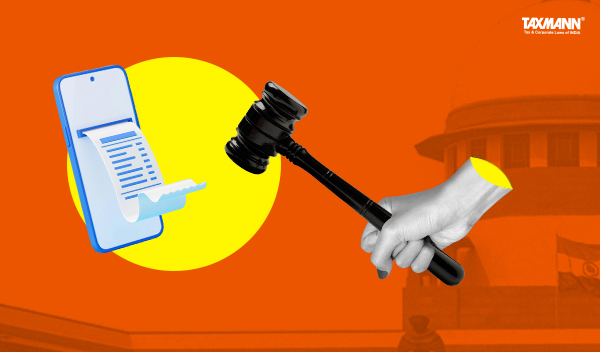Penalty u/s 129(1)(b) to Be Set Aside as Invoice and E-Way Bills Contained Name of Firm Which is Sufficient to Prove Ownership of Goods | HC
- Blog|News|GST & Customs|
- 2 Min Read
- By Taxmann
- |
- Last Updated on 7 January, 2025

Case Details: Vishal Chobia v. State of U.P. - [2024] 169 taxmann.com 561 (Allahabad)
Judiciary and Counsel Details
- Arun Bhansali, CJ. & Vikas Budhwar, J.
-
Vedika Nath, Yashonidhi Shukla, Pranit Bag & Rowsan Jha for the Petitioner.
-
Meenakshi Singh, A.C.S.C. & Ankur Agarwal, S.C. for the Respondent.
Facts of the Case
In the present case, assessee’s claim of ownership of goods detained by GST Authority was rejected and the authority had imposed penalty under section 129(1)(b) of CGST Act, 2017. The assessee filed writ petition and contended that penalty could have been levied under section 129(1)(a) but the authority, despite specific assertion in claim that goods were owned by assessee, found same as incorrect. The Authority submitted that in relation to ownership, Aadhar Card and Pan Card had not been produced.
High Court Held
The Honorable High Court noted that the registration certificate pertaining to GSTIN indicated status of assessee as proprietor of Vishal Enterprise. Further, GSTIN provided specific details pertaining to legal name of business as ‘Vishal Chobia’, trade name as ‘Vishal Enterprise’ and the constitution of business as ‘proprietorship’ which was ‘Aadhar authenticated’.
In view of the specific indications in the official records about M/s. Vishal Enterprise, being the proprietorship of the assessee, turning a blind eye by the officers to the said aspect and refusing to recognize the assessee as deemed owner of the goods being the consignee cannot be sustained. Therefore, it was held that the impugned order was to be set aside.
List of Cases Reviewed
- Halder Enterprises v. State of U.P. (2023) 157 taxmann.com 231
- Margo Brush India & Ors. v. State of U.P. & Anr., Writ Tax No. 1580 of 2022, dated 16.1.2023
- Green India v. State of U.P. (2024) 160 taxmann.com 349
- Ram India Company v. State of U.P. (2024) 167 taxmann.com 164, relied on.
List of Cases Referred to
- Halder Enterprises v. State of U.P. [2023] 157 taxmann.com 231/[2024] 101 GST 313/80 GSTL 357 (Allahabad) (para 3)
- Green India v. State of U.P. [2024] 160 taxmann.com 349/103 GST 15/84 GSTL 33 (Allahabad) (para 3)
- Ram India Company v. State of U.P. [2024] 167 taxmann.com 164/106 GST 323/90 GSTL 227 (Allahabad) (para 3).
Disclaimer: The content/information published on the website is only for general information of the user and shall not be construed as legal advice. While the Taxmann has exercised reasonable efforts to ensure the veracity of information/content published, Taxmann shall be under no liability in any manner whatsoever for incorrect information, if any.

Taxmann Publications has a dedicated in-house Research & Editorial Team. This team consists of a team of Chartered Accountants, Company Secretaries, and Lawyers. This team works under the guidance and supervision of editor-in-chief Mr Rakesh Bhargava.
The Research and Editorial Team is responsible for developing reliable and accurate content for the readers. The team follows the six-sigma approach to achieve the benchmark of zero error in its publications and research platforms. The team ensures that the following publication guidelines are thoroughly followed while developing the content:
- The statutory material is obtained only from the authorized and reliable sources
- All the latest developments in the judicial and legislative fields are covered
- Prepare the analytical write-ups on current, controversial, and important issues to help the readers to understand the concept and its implications
- Every content published by Taxmann is complete, accurate and lucid
- All evidence-based statements are supported with proper reference to Section, Circular No., Notification No. or citations
- The golden rules of grammar, style and consistency are thoroughly followed
- Font and size that’s easy to read and remain consistent across all imprint and digital publications are applied



 CA | CS | CMA
CA | CS | CMA
